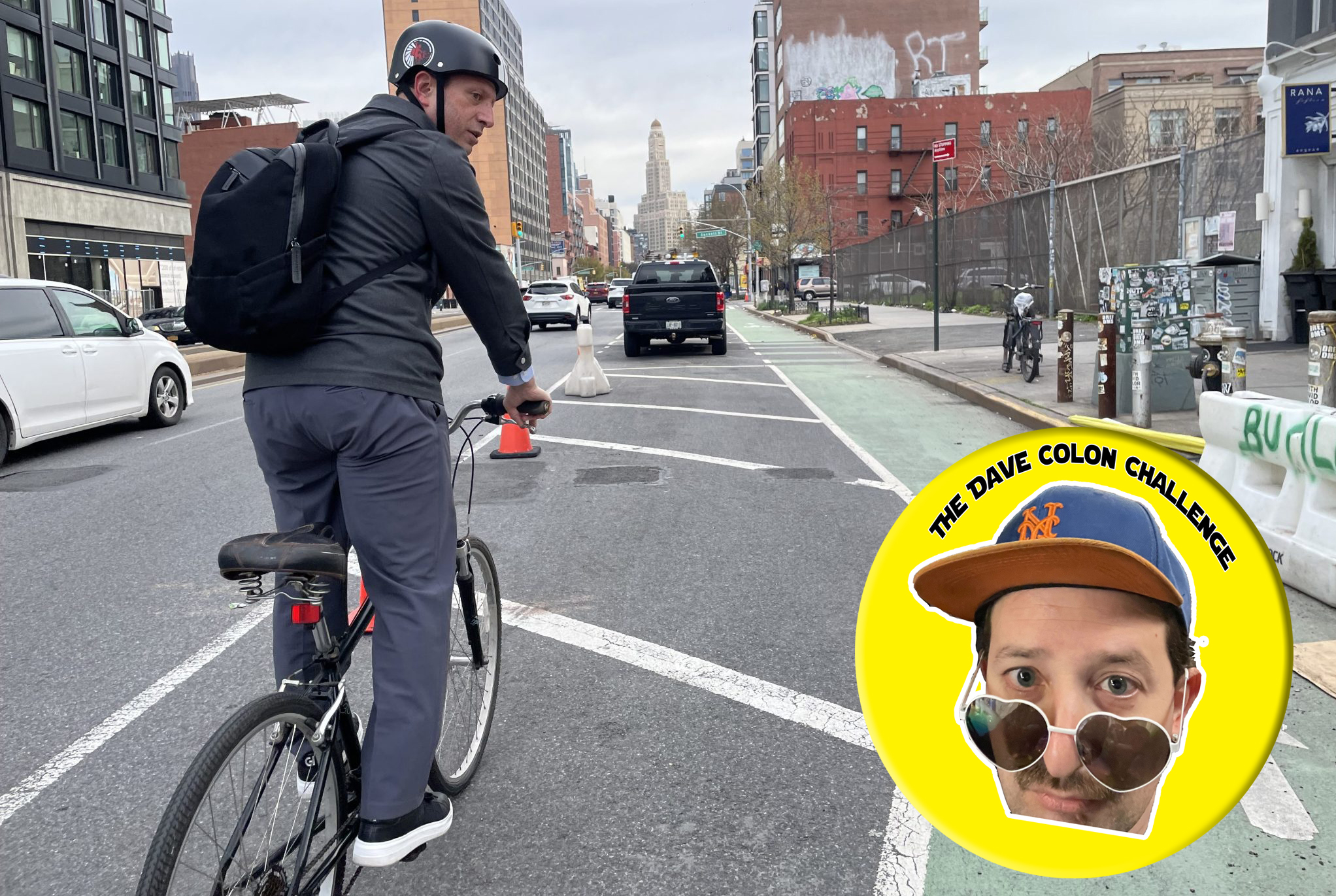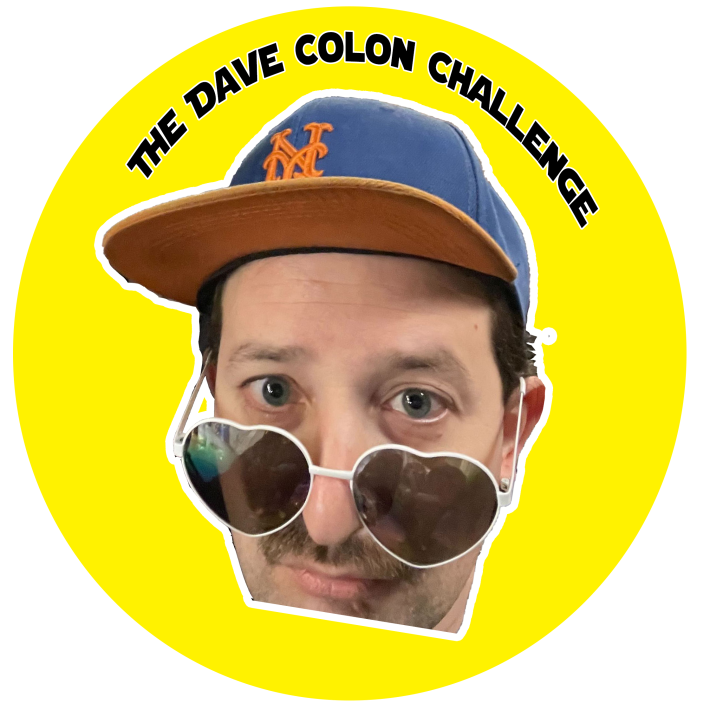
This is the first in a series of bike rides with mayoral candidates orchestrated by reporter Dave Colon. Mayoral candidates interested in taking the Dave Colon Challenge should email dcolon@streetsblog.org.
The last thing that happened on a recent bike ride with Brad Lander is almost unbelievable. As the candidate posed for a photo in front of the David Dinkins Municipal Building, a man driving a pickup truck coming off the Brooklyn Bridge rolled down his window and yelled, "Hey Brad, good luck with everything." It almost makes you believe that Lander is right on one thing: his description of his record as one of taking on fights without alienating people is what City Hall needs.
"I have a track record of living up to the values that I articulate, and being honest with people," Lander said while on a bike ride with Streetsblog's longstanding candidate ride-along coordinator this week. "Not everyone always agrees with all those decisions. So of course, you have tough conversations, and it's New York, people disagree vehemently, and that's what's supposed to happen. I'm not squashing debate or being judgmental or self-righteous. You have a process. You listen to people, you make clear what the adopted values and commitments of the city is, do the research, have the engagement, put the plan out, and then get it done."
So OK, phrases like "living up to the values I articulate" is why Lander's opponents like to call him sanctimonious and even leave his supporters wishing for a less professorial version of the city comptroller. But across four years of transportation policy from the Adams administration that started with a promise of 150 miles of bus lanes in four years and settled on a belief that "bus lanes are gentrification" that led to the stifling or killing of projects on Northern Boulevard, Underhill Avenue, Fordham Road, McGuinness Boulevard and others, it's been clear that the current mayor is simply not good at following a process, making a plan and doing the damn thing.
Lander noted the chaos the Adams approach brought as he biked down Ashland Place between Fulton Street and Hanson Place, where City Hall chose backroom lobbying from real estate interests over safety. As a result, the protected bike lane project got truncated and now remains unsafe.
"Sometimes it's hard; this was not one of those cases. The Department of Transportation designed a plan. They talked to a lot of stakeholders. Everyone had the opportunity to participate, and they published the plan. It's one thing to have stakeholder dialog, and in the process of doing your design, there's a conversation where you say, OK, Brooklyn Academy of Music is on this block but also we need it to be bike-safe. To go through that whole process, publish the plan, the decision is made, and then after that, direct lobbying to City Hall overturns it? That's corruption, that's not stakeholder engagement," he said.
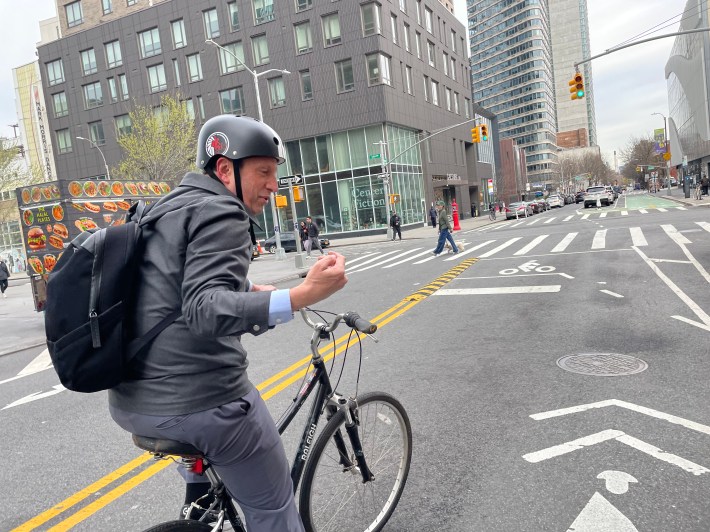
And Lander does live up to the values he articulates. He got his comeuppance when it turned out he'd racked up eight speed camera tickets driving around the city, but also his original version of the law that eventually became the Dangerous Vehicle Abatement Program could have gotten his own car booted. And in a similar vein, he shared a story of supporting the DOT's early efforts to redesign Fourth Avenue by cutting a bunch of left turns.
"When I saw that, my first instinct was like, 'Oh my god, how will I get home?' I had a driver's reaction. I was a Council member at the time, so I got to say to DOT, 'You can't eliminate my left turn. How will I get home?' They walked me through the data, and I figured out it would take like a minute more on average for me to take a slightly different route, and the left turns were where a lot of the crashes were. They got some pushback from the "car-owning but livable streets-friendly" councilman, but they put the data out and I agreed it was the right choice," he said.
It's worth pausing to ask: Why was Lander a car-owning Council member? And why is he a car-owning comptroller? He chalked it up to parenthood and its life of schlepping kids and stuff all over the place. On the plus side, Lander promised that as mayor, he would make it easier for parents to choose the e-cargo bike lifestyle because he'll build out safer walking and cycling routes to schools and public pools.
"Families do ride bikes to the pools, so that needs to be safe. And each time you're thinking about that, you make it easier for someone to make the decision," said Lander.
Despite owning a car, and not being a regular bike commuter to work, Lander was comfortable enough on the ride to be able to talk and gesture and weave through mixed traffic. He also has some skin in the game.
"Citi Bike is probably my son's primary mode of transportation. He's 25 so he's not a kid, but I mean, you worry," he said.
Lander's decision to support the ban on left turns on Fourth Avenue put him at odds with his local community board, though it was hardly the most famous case where he caught flak from his district. Lander emphasized that he does know how to push back against opposition to street safety projects, pointing to his days as an early supporter of the Prospect Park West bike lane, a fight that seems quaint in the rearview mirror, but his opponents at that time included legal heavyweight Randy Mastro, now a deputy mayor.
"We did this 13-question survey that included some open-ended answers, so it wasn't a small thing. Three thousand people responded, 2,000 of them in favor, 1,000 of them opposed. On the one hand, that's decisive, right? Two-thirds of my constituents are for this thing. But on the other hand, that's 1,000 people who have told me they don't want this, and if I keep going and keep supporting and pushing for it might remember and be upset with me about it. But we stayed the course. I'm proud of having done it, and I just have fought a lot of battles like that," he said.
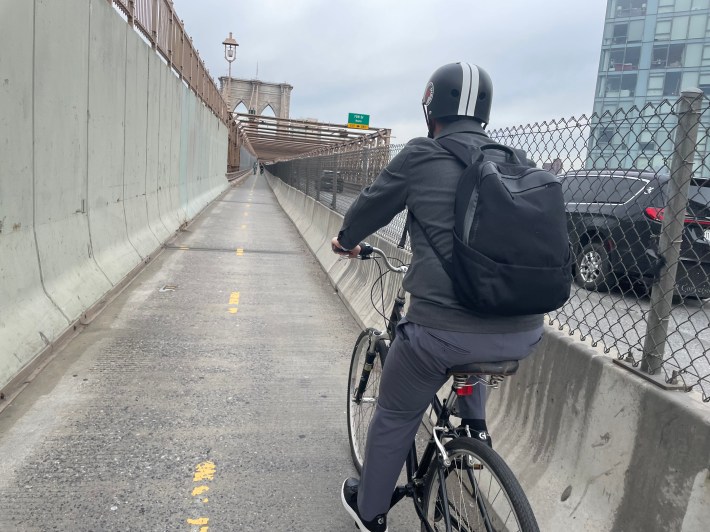
That consensus and data-driven approach will get put to its toughest test yet in 2026 if Lander is in City Hall and is responsible for actually implementing the bus lane and bike lane projects mandated under the Streets Master Plan, especially when the projects need to go in some of the more car-centric neighborhoods in the city.
As Lander sees it, he will be able to build something like the Queens greenway, despite opposition from local Council Member Vickie Paladino, because people will see such things work well elsewhere and will want it for their neighborhoods. A precinct commander can be convinced that his officers don't have carte blanche to park in a protected bike lane. Studies, organizing and engagement can overcome vehement opposition in Lander's telling because he's seen it before.
"We stayed the course. I'm proud of having done it, and I just have fought a lot of battles like that," he said.
The city will need less room for cars under a Mayor Lander one way or the other, because Lander intends to deliver on not just bike and bus lanes but wholesale reuses of the curb.
"By the time I'm done, you're going to have a lot more bus and bike infrastructure, more of the neighborhood loading zones that use the curb, more of those shared containers, especially in denser areas."
"This," he said gesturing at some trash cans haphazardly placed on the sidewalk, "is just not the ideal condition for New York City."
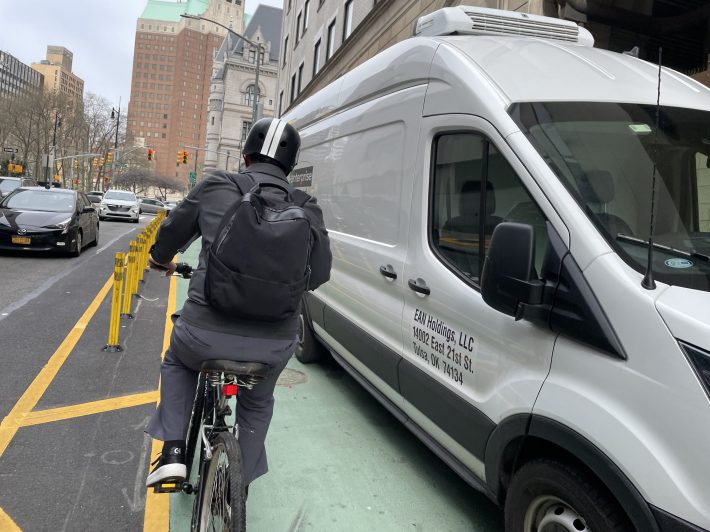
The path to figuring out how that happens has bigger implications than just some more neighborhood loading zones. In Lander's telling, the right collection of transportation talent can help restore trust in government.
"It's not going to be hard for me to come up with really world-class
DOT and transportation leadership. At this moment, with Trump shredding the federal government and Eric Adams having so badly undermined trust and confidence in government here, the opportunity for a reset that has a world-class New York City workforce and world-class leadership is one of the real exciting things. I'll be open to people I don't know yet because there's good leadership in other places. On the other hand, there is so much extraordinary homegrown, New York City resident transportation talent. I'm lucky to have a lot of those folks advising me now, and I will be lucky to have a lot of those folks leading the agencies," he said.
With the experience of victory in his own neighborhood in his back pocket, Lander said he was ready to get other big ideas done. Interborough bus rapid transit, a bike lane on the Brooklyn-bound side of the Brooklyn Bridge, maybe some other seemingly impossible tasks as well.
"I'll definitely bring this bike lane down to Bay Ridge," Lander told Streetsblog while riding on Fourth Avenue, committing to blast through the invisible barrier that has kept any kind of redesign moving south of 64th Street for over a decade.
[Editor's note: The man most responsible for not getting the Fourth Avenue bike lane done — Bay Ridge Council Member Justin Brannan — is running to succeed Lander as comptroller.]
